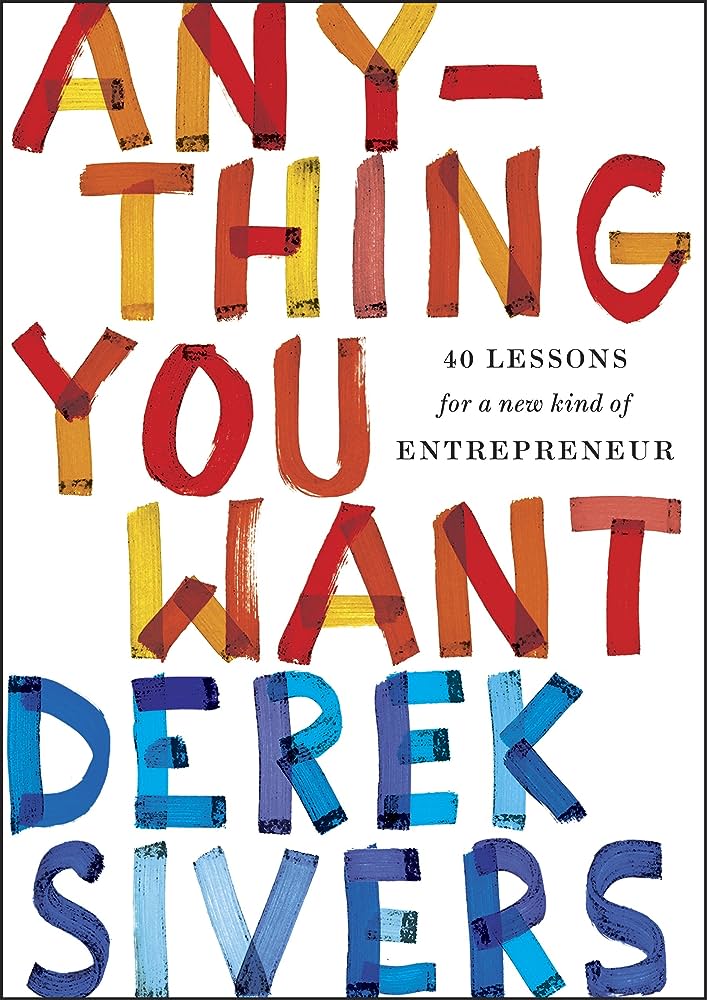Anything You Want by Derek Sivers — Book Summary and Notes
Ten Years of Experience in 10 Mins. Business is not about making money. It’s about making dreams come true for others and yourself.
Ten Years of Experience in 10 Mins
- Business is not about making money. It’s about making dreams come true for others and yourself.
- Creating a company is a great way to improve the world while improving yourself.
- When you make a company, you make a utopia. It’s where you design your perfect world.
- Never do anything just for money.
- Don’t pursue business just for your gain. Only answer the calls for help.
- Success comes from persistently improving and inventing, not from persistently promoting what’s not working.
- Your business plan is moot. You don’t know what people want until you start doing it.
- Starting with no money is an advantage. You don’t need money to start helping people.
- You can’t please everyone, so proudly exclude people.
- The real point of doing anything is to be happy, so do only what makes you happy.

Anything You Want
40 Lessons for a New Kind of Entrepreneur By Derek Sivers
What’s your compass?
Most people don’t know why they’re doing what they’re doing. They spend decades pursuing something someone convinced them they should want without realizing it won’t make them happy.
“Hell yeah!” or “No.”
When deciding whether to do something, if you feel anything less than “Wow! That would be amazing! Absolutely! Hell yeah!” then say no.
Ideas are just a multiplier of execution.
Ideas are worth nothing unless they are executed. That’s why I don’t want to hear people’s thoughts. I’m not interested until I see their execution.
Proudly exclude people
It’s a prominent place. You can loudly leave out 99% of it. Have the confidence to know that when your target 1% hears you. You’ve shown how much you value them.
“I miss the mob.”
‘When the mafia ran this town, it was fun. Only two numbers mattered: how much was coming in and how much was going out. As long as there was more in than out, everyone was happy. But then the whole town was bought up by these damn corporations full of MBA weasels micromanaging, trying to maximize the profit from every square foot of floor space. Now the place that used to put ketchup on my hotdog tells me it’ll be an extra 25 cents for ketchup!
Never forget why you’re doing what you’re doing. Are you helping people? Are they happy? Are you happy? Are you profitable? Isn’t that enough?
How do you grade yourself?
We all grade ourselves by different measures:
- For some people, it’s as simple as how much money they make. When their net worth is going up, they know they’re doing well.
- For others, it’s house much they give.
- For some, it’s how many people’s lives they can influence for the better.
- For others, it’s how deeply they can influence just a few people’s lives.
Act like you don’t need the money
We want to give to those who give.
Don’t punish everyone for one person’s mistake.
As a business owner, when you get screwed over by someone, you might be tempted to make an extensive grand policy that you think will prevent you from ever getting screwed over again: One employee can’t focus and spends his time surfacing the Web. Instead of just firing that employee, the company installs an expensive content-approving firewall so nobody can go to unapproved sites anymore.
When one customer wrongs you, remember the hundred thousand who did not. You’re lucky to own your business.
A real person, a lot like you
It’s dehumanizing to have thousands of people passing through our computer screens, so we do things we’d never do if those people were sitting next to us. It’s too overwhelming to remember that at the end of every computer is a real person, a lot like you. Even if you place it right now, will you remember it next time you’re overwhelmed, or perhaps never forget it again?
The most successful e-mail Sivers ever wrote
‘Your CD has been gently taken from our CD Baby shelves with sterilised contamination-free gloves and placed onto a satin pillow.
A team of 50 employees inspected and polished your CD to ensure it was in the best possible condition before mailing it.
Our package specialist from Japan lit a candle, and a hush fell over the crowd as he put your CD into the finest gold-lined box that money can buy.
We all had a wonderful celebration afterward, and the whole party marched down the street to the post office where the entire town of Portland waved “Bon Voyage!” to your package, on its way to you, in our private CD Baby jet on Friday 6th.
I hope you had a wonderful time shopping at CD Baby. We sure did. Your picture is on our wall as “Customer of the Year.” We’re all exhausted but can’t wait for you to come back to CDBaby.com’
Little things make all the difference
- “You have 5 hours, 18 minutes until our next FedEx shipment.”
- “CD Baby loves [first name].”
- “We’ll do anything for a pizza.”
- “Where did you hear of this artist? We’ll pass them any message you write here.”
- “Any special requests?”
It’s OK to be casual.
Don’t try to impress an invisible jury of MBA professors. It’s OK to be casual.
Prepare to Double
“More of the same” is never the answer. You have to do things differently to handle twice as much business.
It’s about being, not having
Yes, it may take longer. Yes, it may be inefficient. Yes, it may even cost you millions of dollars in lost opportunities.
You might get bigger faster and make millions if you outsource everything to the experts. But what’s the point of getting bigger and making millions? To be happy, right?
To have something is the means, not the end.
To be something is the real point.
Derek's $3.3 Million Mistake
Yes, it turns out that when I borrowed the $20,000 eight years earlier, I didn’t realize I got the $20,000 by selling 90% of Hit Media Inc. to my dad’s company.
Nobody thought my little hobby was going to turn into a multimillion-dollar business. It was my fault for not reading what I signed. My fault for letting a bank’s teller give quick advice to make that significant decision for my business structure.
Delegate or Die.
You know you need help, but finding and training someone would take longer than you have. So you keep working harder until you break.
- Gather everyone around
- Answer the question and explain the philosophy
- Make sure everyone understands the thought process
- Ask one person to write it in the manual
- Let everybody know they can decide this without me next time.
Being self-employed feels like freedom until you realize that your business crumbles if you take time off. To be a true business owner, make it so that you can leave for a year, and when you come back, your business will be doing better than when you left.
Make it Anything You Want
Everyone assumes that as the company's owner, you’ll be the traditional CEO, having high-powered lunches with other high-powered CEOs and doing all the business deals. But what if you don’t like doing that? What if what you love the most is the solitude of the craft?
Happiness is the real reason you’re doing anything, right? Even if you say it’s for the money, money is just a means to happiness.
Trust, but Verify.
Remember it when delegating. You have to do both.
Delegate but not Abdicate.
- “Which profit-sharing plan should we go with?”
- “You guys choose. Whatever you think is best.”
Six months later, my accountant called me, saying, “Did you know that your employees set up a profit-sharing program?”
- “Yeah. Why?”
- “Did you know that they’re giving all of the company's profits back to themselves?”
Oops. I had empowered my employees so much that I gave them all the power.
You make your perfect world
A business is a reflection of the creator.
- Some people want to be billionaires with thousands of employees. Some people want to work alone.
- Some want as much profit as possible. Some want as little profit as possible.
- Some want to be in Silicon Valley with Fortune 500 customers. Some want to be anonymous.
No matter which goal you choose, many people will tell you you’re wrong. Just pay close attention to what excites you and what drains you. Pay close attention to when you’re the real you and trying to impress an invisible jury. Even if you’re slowing your business’s growth—if it makes you happy, that’s OK. It’s your choice to remain small. Whenever you make it, it’s your creation, so make it your dream come true.

